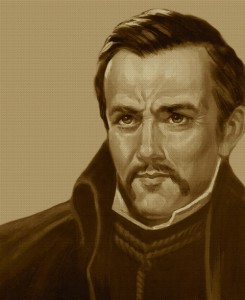A special celebration of a Moray martyr, and the only Scot to be canonised since the reformation, will be held in his hometown of Keith next month- more than 440 years after his birth.
John Ogilvie – who died at the end of a hangman’s rope, unwilling to set aside his faith – once smuggled himself into Scotland to offer support to the nations practising Catholics.
Their religion had been banned but he preached in secret in their homes until his arrest.
Roman Catholic Bishop of the Aberdeen diocese, Hugh Gilbert, will preside over the feast of St John Ogilvie at the shrine of his birthplace.
Mass will be celebrated at St Thomas’ Church on Saturday, March 7, at 2pm in honour of the saint.
Born in 1579, he was the son of respected Calvinist estate owner Walter Ogilvie.
But aged 12 he was sent to study on the continent and attended many Catholic establishments before eventually converting to the faith aged 17.
He joined the Jesuit order and was ordained as a priest in 1610 at a time of heightened sectarian tensions across Europe.
St John returned to his homeland to administer to Glasgow’s few remaining Catholics after the religion was outlawed in 1560.
Disguising himself as a horse trader, he began to preach in secret in the private homes of the faithful.
But by 1614 he was discovered by authorities and arrested in Glasgow.
After refusing to pledge allegiance to King James on matters of faith he was hung and then drawn at Glasgow cross, aged about 36.
Folklore states he threw his rosary beads into the crowd as he stepped off the platform- and that the man who caught them also later converted.
It would take hundreds of years for him to be made a saint, with the process finally completed in 1976.
Bishop Hugh said: “Every year in early March the Catholics of Keith and around commemorate their local-born saint, John Ogilvie.
“He lived in the turbulent times of religious divide.
“As a young man he became a Catholic and in time a Jesuit priest, returning to Scotland illegally to minister to the scattered Catholics of the country.
“He was apprehended by the authorities and on March 10, 1615, he was hanged in Glasgow.
“He denied the charge of treason saying that he fully respected the authority of the King in all temporal matters, but he was not prepared to accept that authority when it intruded on matters of faith and conscience.
“He was only in his 30s and is remembered as a man of character and integrity.
“Those times of bitter religious controversy are today largely past in Scotland, happily, and so Ogilvie’s sense of personal conviction can now speak to all those who treasure freedom of religion and conscience.”
